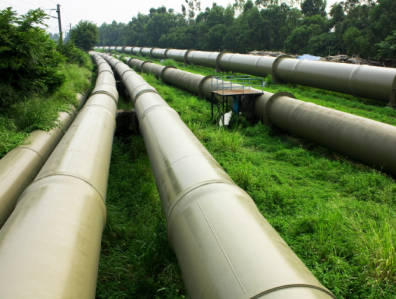Bala Wunti, the group general manager, National Petroleum Investment Management Services (NAPIMS) has said the government is planning to reopen the Trans-Niger crude oil pipeline, after a six-month force majeure.
According to the statement he made on his official Twitter account on October 1, the NAPIMS delegation made a visit to the Bodo Community in the Gokana Local Government Area of Rivers State. The visit was necessary in order to ascertain the challenges of the people in the community and address them in order to secure the national hydrocarbon infrastructure in their domain.
The Trans-Niger Pipeline (TNP) is operated by Shell Petroleum Development Company Joint Venture (SPDC JV).
The Trans-Niger pipeline was inactive as of April 2022 due to oil theft. As of August 2022, a joint investigation visit carried out by the National Oil Spill Detection and Response Agency (NOSDRA) revealed that a leak on the Trans-Niger Pipeline in Bodo Community, Rivers state, was caused by third-party interference. According to NOSDRA, the pipeline discharged crude oil into the environment and spread to farmlands.
In the past, there have been reported pipeline leaks in several communities in Rivers State. Reliable sources told Nairametrics that as far back as July 2013, there have been over a hundred pipeline leaks on the Trans-Niger Pipeline, across various communities in Rivers State, due to bunkering activities.
These usually lead to shutdowns/force majeure. For instance, in July 2017, SPDC shut the Trans-Niger pipeline due to a leak at B-Dere, Ogoniland, Rivers State. In July 2016, the pipeline was shut down due to a leak at the Gio community in Ogoniland, Rivers State.
In September 2022, Vanguard reported that SPDC was in talks with people in the Bodo Community and the community had given both SPDC and regulators some conditions before granting them access to the pipeline.
Estimated metrics of financial loss since April 2022
A crude oil analyst told Nairametrics that Nigeria has recorded huge financial losses due to the inactivity of the Trans-Niger pipeline.
According to him, the TNP line sends about 180,000 barrels per day to Bonny Terminal, which is 15% of Nigeria’s daily production. The lowest average price of crude since April 2022 is $86 per barrel.
86 x 180,000 = $15,480,000 daily
86 – 40 = $46 as profit margin
46 x 180,000 = $8,280,000 daily
$40 is operational expenditure and other costs.
$8,280,000 x 30 days = $248,400,000 per month.
For the period between May to September 2022 (5 months);
248,400,000 x 5 Months = $1,242,000,000.
To sum it up, with a daily production of 180,000 barrels per day, the estimated loss at a price of $86 per barrel amounts to $1.2 billion.
Why is Bodo Community the focus?
- The TNP majorly passes through Bodo to Bonny, and people have easy access and means of transportation of bunkered crude oil.
- The focus on the Bodo Community could be an initial step for community engagements to help the oil and gas industry.
- People in the Bodo Community have prevented Shell from access to repair sections of the TNP line. If those sections are not repaired, it will be difficult to start the TNP line. There will be a significant loss of production as long as TNP is out of the question. Nigeria won’t be able to boost her Organization of Petroleum Exporting Countries (OPEC) quota.
- Bonny Light is Nigeria’s premium crude oil, which has suffered a significant setback due to TNP, Nembe Creek Trunkline (NCTL) outages. The Bonny Oil Terminal has been moribund because of no flows from the major pipelines. The leaks have cost the country a huge financial loss.
What you should know
- The pipeline is capable of transporting about 180,000 barrels of crude per day. The pipeline capacity is about 15 percent of Nigeria’s most recent average daily output.
- The Nembe Creek Trunkline (NCTL) and Trans Niger Pipeline (TNP) are the two major trunk lines within the Bonny pipeline system. The Bonny oil pipeline system is the largest pipeline network in the Niger Delta and transports oil, water, and associated gas from the eastern and central delta to the Bonny oil and gas terminal.
- The terminal, situated on Bonny Island, 48 kilometers southeast of Port Harcourt, is the biggest in Africa with a capacity to process and export 1.25 million barrels per day.














